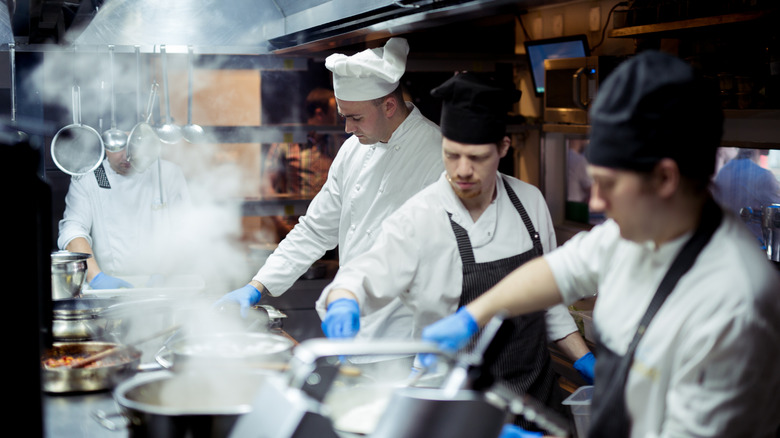What It Means When You Hear A Chef Shout 86
If you've watched the Hulu series "The Bear," then you may wonder if chefs have a language of their own. From phrases like "yes chef" to "heard," the show has given us normies a window into what it's like to be in a professional kitchen and to pick up on some of that chef lingo. It may be good to brush up on some of these terms before this summer's new season.
A term like "behind!" seems intuitive. That's usually said by anyone in the kitchen walking past someone with their back turned towards them. It's to avoid crashing into each other while carrying sharp or otherwise dangerous items in the kitchen, such as hot oil or food, knives, sharp knives, and bubbling sauces. But there's one term that needs a little digging because it's a number, and if you're not in the know, there's no way to figure out what it means.
When a chef says "86," they mean something is sold out or unavailable. And it doesn't just apply to food. Staff can get "86-ed," too. Dun-dun-dun.
What is a burger, 86 pickles?
Chefs always use the term "86" in a professional kitchen. But it's not always used in the same way; in fact, there are many different ways to use the term.
Let's say a customer orders a burger without pickles. The chef may read the order to the kitchen as "burger, 86 pickles" to indicate that the pickles need to be eliminated from the order. The phrase is also used to indicate that something needs to be taken off the menu or that something's sold out.
A guest can also be "86-ed." If a rowdy customer needs to be shown the door, they are "86-ed" from the restaurant. "86 the guy at the end of the bar, he's had enough to drink," for example. Moreover, "86" can also be used to fire somebody. "86 the line cook" would mean the employee is sacked. Yikes. There are several theories about why chefs have settled on this exact number.
Where did 86 come from?
It's not clear what the exact origin of this term is. Let's begin with the door. A door frame is usually eight feet and six inches high. Showing someone the door meant "86-ing" them. The measurements of a grave are typically 8 feet long and 6 feet deep, so the term could also have originated from the notion of "killing" something off the menu.
"86" may also have come from a military code. The Uniform Code of Military Justice has Article 86, which means absence without leave, i.e., firing someone. Another military reference is that a soup pot at an Army mess line has 86 ladles worth. After serving the pot, the soup was "86-ed," meaning it was finished. Many U.S. Naval Allowance Type (AT) codes are also assigned to equipment tasks. The code AT-6 means some equipment needs to be disposed of. When you say "AT-6" out loud, it sounds like "86." The code may have stuck as a number, meaning to eliminate something.
In another instance, the term may be linked to whiskey, when a consumer trend for wanting lighter whiskey blends cropped up in the mid-1930s. By the '50s, distilleries were having a hard time selling 100-proof aged whiskey, So they started making a lighter version of their bonded bottles, lowering the proof to 86-proof, and thus, the bottle had been "86-ed."
Regardless of its origins, the term has caught on and is still used in restaurants today. "The Bear" has shown us much of this lingo and how difficult it can be to open a new restaurant. Along with culinary training, you'll need some linguistic training, too!


